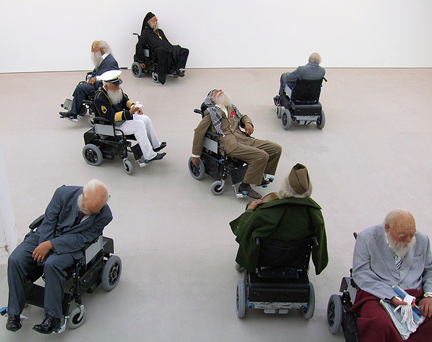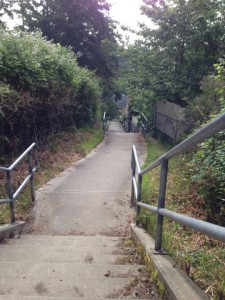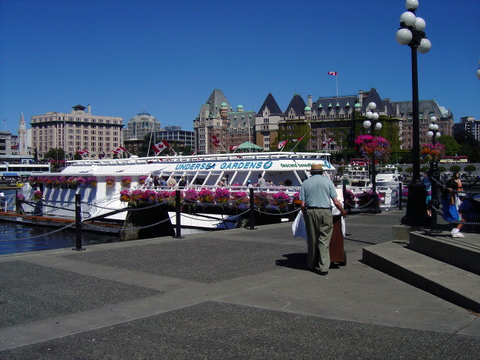
Old Person’s Home, an art exhibit at Saatchi Gallery, London. Photo © Jim Limwood, Creative Commons via flickr
Take 12 minutes.
Twelve minutes represent less than one per cent of a day.
If you work full-time, commute, ferry kids around, do chores, 12 minutes of free time allows you to catch your breath, prepare for the next crisis, or give your kids some undivided attention. Or 12 minutes means you’re late and you’ll be scrambling for the rest of the day.
If, however, your days lack the luxury of busy-ness—if, for example, you depend on others to help you dress, bathe, move about, arrange your social and recreational activities, and provide your meals—12 minutes may seem a mere eye blink in a day that stretches on and on like a geological epoch. Even if you subtract the eight hours of your day spent sleeping, the one hour spent bathing, dressing and personal care, three generous hours for eating and preparing to eat, you still face 12 hours of unalloted time. That’s 60 12-minute periods.
According to the Island Health spokesperson quoted in Katherine Dedyna’s April 9 article in this newspaper, 12 minutes is the minimum amount of physiotherapy or occupational therapy, nursing, or other “allied services” that each senior in residential care in the region receives each day from Island Health. Using $40 as an hourly average payment, Island Health funds 26 facilities almost $3,000 a year per resident, with services determined by the assessed needs of the individual residents. That means one facility may provide more hours of physiotherapy and another may arrange for more social-work hours per resident.
WIth the funds covering the spectrum of allied health services, most residents at most public long-term care facilities in the region receive much less than 12 minutes of physically active therapy daily, if any at all.
Seniors Advocate Isobel Mackenzie highlights that lack in her report, Placement, Drugs and Therapy: We Can Do Better. She reveals that fewer than 12 per cent of B.C. seniors in public residential care homes receive weekly physiotherapy, and only 22 per cent receive recreational therapy such as chair exercises or bingo.
What she doesn’t detail is that, in some residential care facilities, if you need help to stand up, you likely spend your days sitting. Care home staff encourage you to use a wheelchair….
Read the rest of this editorial at the Victoria Times Colonist.














